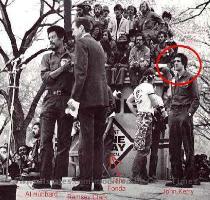In victory for Obama, Senate panel set to push approval of nuclear treaty with Russia
By Desmond Butler, APThursday, September 16, 2010
US Senate panel poised to approve nuclear treaty
WASHINGTON — The Obama administration was poised for a victory on one of its top foreign policy goals Thursday as a Senate panel appeared likely to recommend approval of a U.S.-Russia nuclear arms control treaty with a bipartisan majority.
It was not clear that the administration has the votes or the time to get the treaty, known as New START, to the Senate floor for ratification this year. Hopes for passage improved this week, however, as a second Republican on the Foreign Relations Committee looked likely to support it.
As he opened a meeting to consider the treaty, committee Chairman John Kerry, D-Mass., cast the accord as essential for U.S. national security. “The stakes are enormous,” he said.
Obama and Russian President Dmitry Medvedev signed the treaty in April. It would shrink the limit on strategic warheads to 1,550 for each country, down about a third from the current ceiling of 2,200. It also would implement changes in current procedures that allow both countries to inspect each other’s arsenals and verify compliance.
Democrats had delayed a committee vote on the treaty as they sought broader support from Republicans. They will need at least eight Republican votes on the Senate floor to have the two-thirds majority needed for ratification.
Some Republicans say the pact does not establish adequate procedures for ensuring that Russia abides by its terms. They also fear that Moscow could use the treaty to limit U.S. missile defense plans. Some Republicans also are tying their support to assurances that Democrats will provide more money to maintain and improve existing nuclear warheads.
But the treaty’s prospects received a boost this week when a Republican on the Foreign Relations Committee, Sen. Bob Corker, endorsed an amendment from the committee’s senior Republican, Sen. Richard Lugar, aimed at overcoming his party’s reticence on the treaty.
But some Republicans weren’t persuaded and Tuesday’s debate became heated at times. Sen. Jim DeMint, R-S.C., cited the missile defense concerns and said the treaty would undermine U.S. security.
“If we are going to move ahead with the commitment not to protect the people of the United States, I think everyone in this country ought to know it,” said DeMint.
That provoked the ire of Kerry and other Democrats, who said that all the lawmakers were committed to protecting the American people.
Democrats say the treaty could be considered by the full Senate before the November congressional election. But given the intense partisan atmosphere in Washington in the run-up to the vote, Democratic prospects may be better in a “lame-duck” session that would take place after the elections, but before the new Congress is seated. Passage could be more difficult under a new Congress because Republicans are expected to pick up seats in the election.
The administration has held the treaty up as a sign that its efforts to improve relations with Russia have borne fruit. Failure to ratify the treaty or a long delay would represent a significant foreign policy setback.
(This version corrects name of treaty to New START.)
Tags: Eastern Europe, Europe, Foreign Policy, International Agreements, John Kerry, North America, Political Organizations, Political Parties, Russia, United States, Washington

